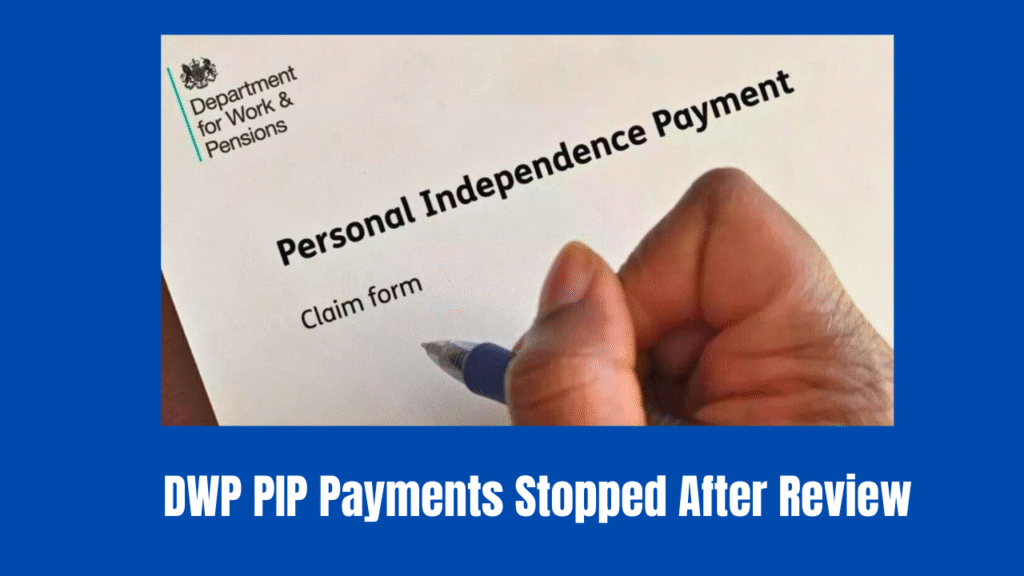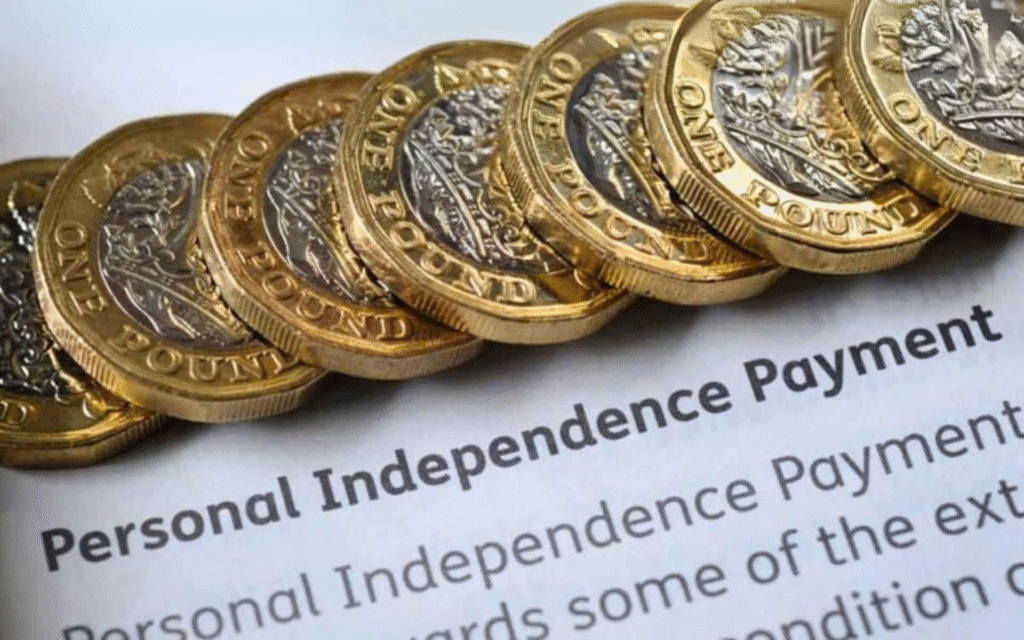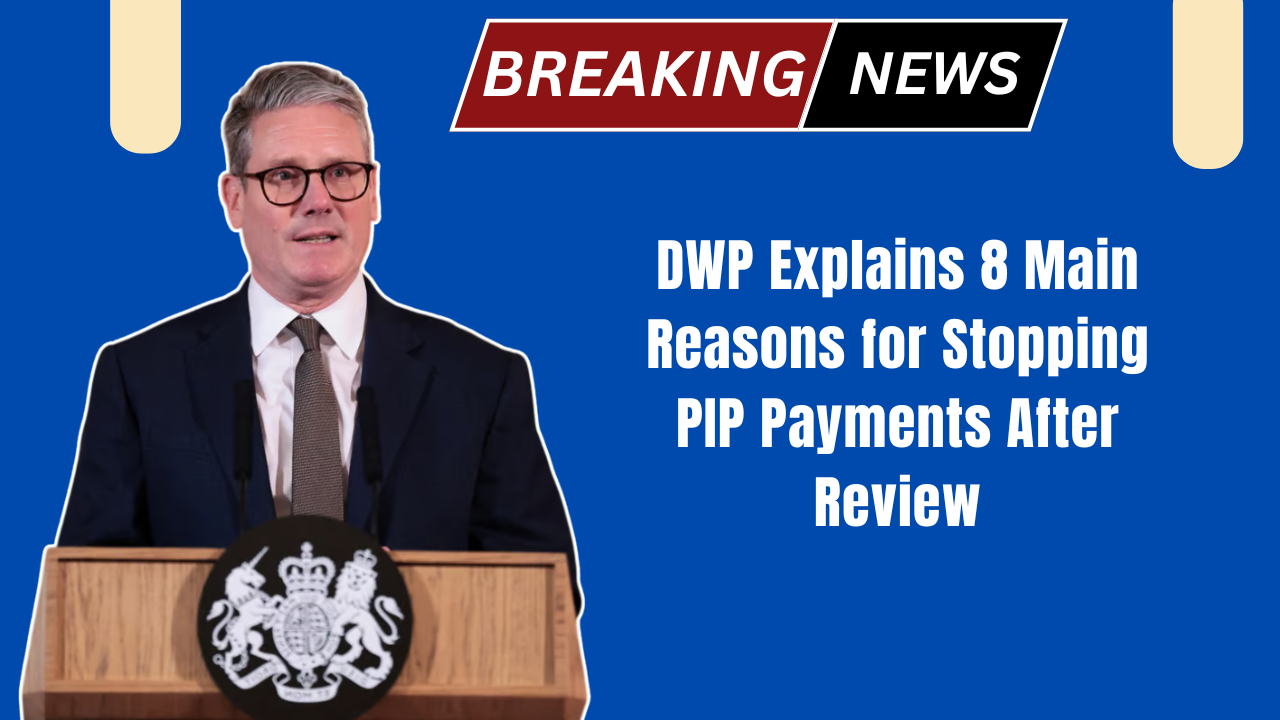A PIP is needed by those people in the UK who suffer long-term disabilities or have long-duration health conditions but need some money to support themselves). This benefit is administered by the Department for Work and Pensions (DWP), which is intended to help pay some of the extra costs incurred in daily living or accessing mobility resulting from physical or mental conditions.
PIPs, however, are reviewable and therefore not permanent. PIP payments may be stopped or lowered in certain circumstances, as is becoming clear with increased scrutiny and heightened reviews. With rising noise over the last few years, many claimants find themselves in situations they never could have imagined, where their payments are lowered or taken away completely. The DWP has put forward a whole list of eight reasons as to why this might be so, an important understanding about PIP for any recipient.
DWP PIP Payments Stopped After Review

PIP payments provide support for people with long-term conditions or disabilities. Understanding the reasons for the entitlement loss and one’s rights will keep one informed and proactive in the use of the benefits, even if payments are stopped. But if your payments are stopped, immediately seek advice and take the necessary steps to rectify the situation.
| Reason for Stoppage | Explanation | What to Do |
|---|---|---|
| Change in Circumstances | Health improves or living situation changes. | Inform DWP immediately to avoid penalties. |
| Missed Review Deadlines | Failure to return forms or attend assessments. | Health improves or the living situation changes. |
| Fixed-Term PIP Expiry | Claim ends without renewal. | Reapply for PIP if your condition persists. |
| Overpayment Recovery | DWP claims you’ve been overpaid. | Challenge the decision through a reconsideration. |
| Allegations of Fraud | Suspected fraud or incorrect information. | Seek legal advice and cooperate with investigations. |
| Immigration Status Change | Your right to reside in the UK has changed. | Ensure DWP is informed of your current status. |
| Extended Hospital or Care Home Stay | PIP stops after 28 days in certain facilities. | Inform DWP if your stay is temporary. |
| Failed to Report Changes | Not updating DWP about condition or situation changes. | Keep your records updated with the DWP. |
Understanding DWP’s Review Process
DWP usually arranges a steady check of PIP claimants to ensure the criteria demonstrating the claimant has not changed. The change of circumstances could include hospitalization or inclusion of other differences that improve most health conditions or living conditions. When a review happens, the DWP will send a letter requesting updated information or invite you to a reassessment. If this process is not completed within the required time frame, then PIP payments could be suspended or even terminated.
1. Change in circumstances
Changes in the claimant’s life are usually the most common avenues through which PIP payments are terminated. Improvements in health, changes in the condition’s severity, or a major shift in living arrangements can suffice in losing this benefit.
Example: If someone lived in a care home or hospital for quite some time, PIP payments could be stopped after 28 days. It is really important to update the DWP regarding such changes to avoid overpayments or penalties in the future.
2. Failure to meet deadlines for Reviews or Forms
DWP generally sends out review forms or requests for assessments. Your payments would be suspended or stopped if you failed to send it in time or did not show up for a scheduled assessment.
Advice: Always keep an eye out for correspondence from DWP. If you miss a deadline, contact the DWP immediately to explain the situation and request an extension.
3. Expiration of a Fixed-Term PIP Award
Payments wane after the fixed-term award of PIP, mostly from one to five years. They would end when that period ends, and either a claimant reapplies or a review leads DWP to renew the award.

Tip: If your condition has not improved by the end of the term, it is critical to start the renewal process early by completing and submitting the required forms.
4. Recovery of Overpayment
The DWP may state that you were overpaid because of either erroneous determinations on your first assessment or even by your failure to report a change in your circumstances. In that case, the DWP will either decrease or completely stop your payments in pursuit of recovering the amount. What You Can Do: If you believe that the decision to overpay is wrong, challenge the decision with Mandated Reconsideration, which is really just an appeal process within the DWP.
5. Allegation of fraud
Fraudulent activities include giving false information or failing to report changes in your health or cards. Therefore, any payments can be stopped immediately. Such acts are considered very seriously by the department, and a claim could be fined or have a legal action taken against him/her.
Advice: If you are accused of fraud, seek legal advice or consult with the investigators.
6. Changes in Immigration Status
Eligibility to apply for PIP depends on having the legal right to live in the UK. If your immigration status changes, it could affect your ability to get PIP.
Tip: Always maintain your immigration status with the DWP and let them know of any changes.
7. Long Stays in Hospitals or Care Homes
Usually, PIP payments are suspended when a claimant is in a hospital or care home for more than 28 days with respect to both daily living and mobility components of this benefit.
What to Do: Let the DWP know if your stay is temporary. Payment will resume when you leave.
8. Failure to Report Changes
You have a legal obligation to inform the DWP about significant changes in your health or circumstances. Otherwise, your payments may be stopped.
Best Practice: It is best to inform the DWP of any changes, including improvement or worsening of your condition so that you can avoid penalties or overpayment.

What to Do if Your PIP Is Stopped?
Paying Since it’s important not to panic when your PIP payments are stopped; it is advisable first to do the following:
- Mandatory Reconsideration Request: Ask DWP to review the decision. It’s important to inform them that you cannot agree to the decision, especially if the reconsideration did not lead to a positive outcome, and to submit any improved medical evidence that you may have at hand.
- Appeal to Independent Tribunal: If the reconsideration does not prove successful, then you have the possibility of appealing before an independent tribunal.
- Reapply for PIP: PIP should be reapplied if the claim has been fully denied while the illness is still there.
- Contact the PIP Helpline: The helpline should be contacted on behalf of those who had payments stopped for missing deadline forms or review forms and were unable to submit a claim on time. They could even extend the deadline or reschedule assessments in some cases.
FAQs:
Why Are PIP Payments Stopped?
PIP payments are typically stopped for reasons like missed review deadlines, changes in health, the end of a fixed-term award, or suspicion of fraud.
How Can I Challenge a Decision?
You can challenge a decision by requesting a Mandatory Reconsideration within one month of the decision. If unsuccessful, you can appeal to an independent tribunal.
How Long Do I Have to Submit a Reconsideration Request?
You have 30 days from the date of the DWP’s decision to request a Mandatory Reconsideration.
What Should I Do if My PIP Review is Delayed?
Contact the PIP helpline, provide any missing documentation, and follow up regularly to ensure the review progresses.
